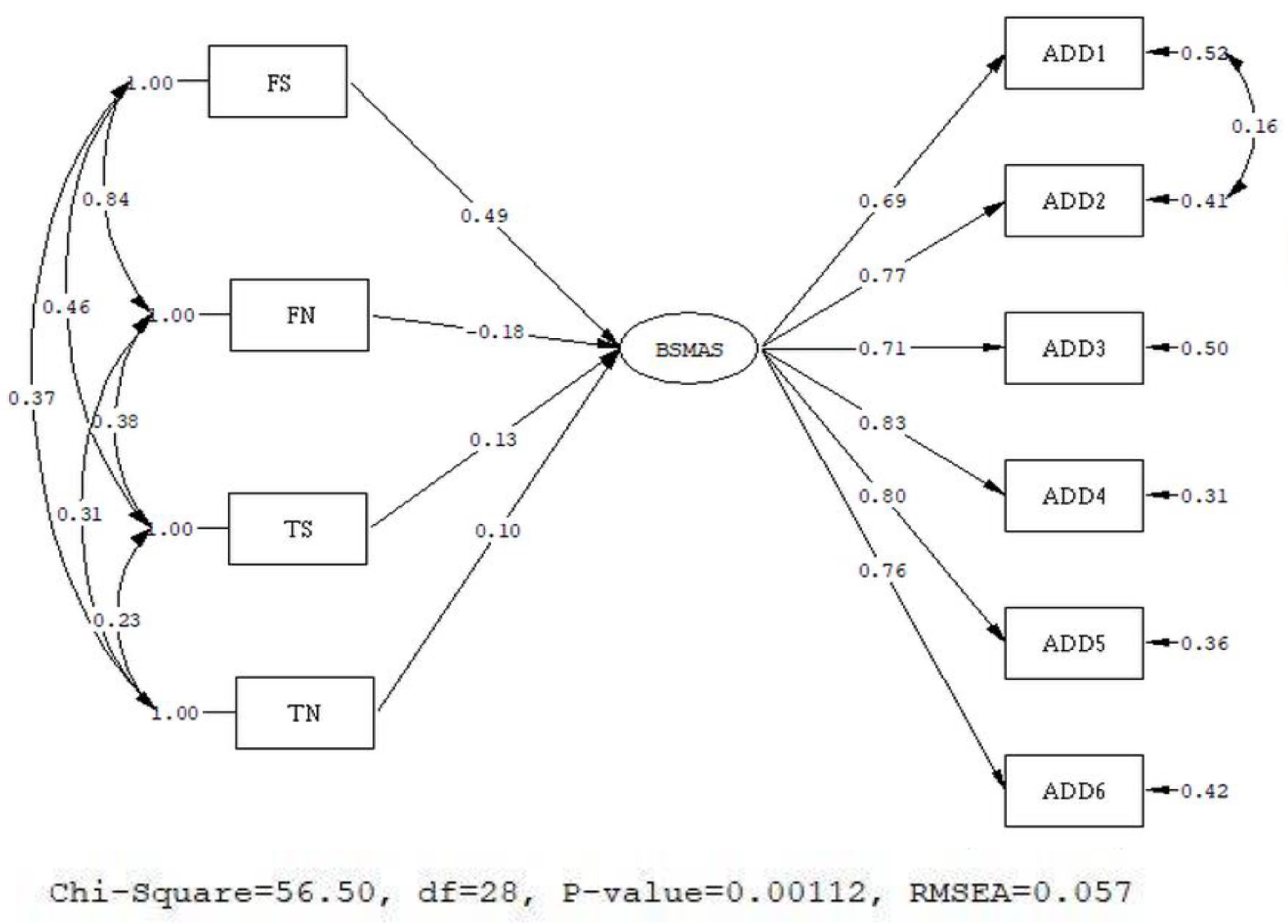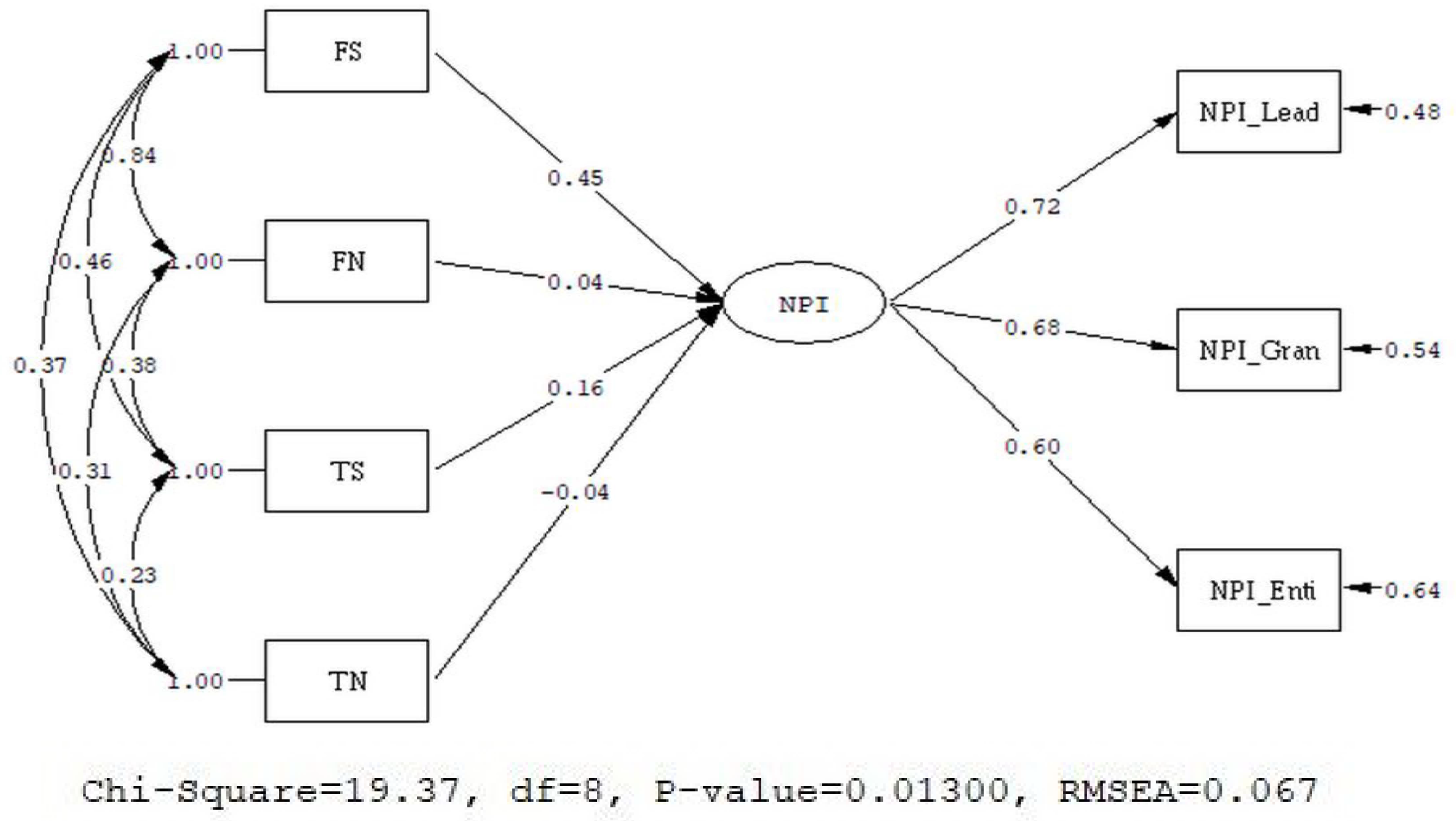Ephemeral But Influential? The Correlation between Facebook Stories Usage, Addiction, Narcissism, and Positive Affect
Abstract
1. Introduction
2. Materials and Methods
2.1. Participants and Procedures
2.2. Measures
2.2.1. Bergen Social Media Addiction Scale
2.2.2. Narcissistic Personality Inventory–13 (NPI-13)
2.2.3. PANAS-10
3. Results
3.1. Preliminary Analyses
3.2. Statistical Analyses
3.2.1. Model 1: MIMIC Model on BSMAS
3.2.2. Model 2: MIMIC Model on NPI-13
3.2.3. Model 3: MIMIC Model on PA
4. Discussion
5. Conclusions
Author Contributions
Funding
Conflicts of Interest
References
- Bayer, J.B.; Ellison, N.B.; Schoenebeck, S.Y.; Falk, E.B. Sharing the small moments: Ephemeral social interaction on Snapchat. Inf. Commun. Soc. 2016, 19, 956–977. [Google Scholar] [CrossRef]
- Constine, J. Facebook Stories Have 500 Million Daily Users. TechCrunch, 2019. Available online: https://techcrunch.com/2019/04/24/facebook-stories-500-million/ (accessed on 17 June 2020).
- Sentient Decision Science. Instagram Stories and Feed. Facebook, 2017. Available online: https://www.facebook.com/business/news/insights/how-do-people-perceive-and-use-instagram-stories-and-feed (accessed on 17 June 2020).
- Brailovskaia, J.; Margraf, J.; Köllner, V. Addicted to Facebook? Relationship between Facebook Addiction Disorder, duration of Facebook use and narcissism in an inpatient sample. Psychiatry Res. 2019, 273, 52–57. [Google Scholar] [CrossRef] [PubMed]
- Hong, F.-Y.; Huang, D.-H.; Lin, H.-Y.; Chiu, S.-L. Analysis of the psychological traits, Facebook usage, and Facebook addiction model of Taiwanese university students. Telemat. Inform. 2014, 31, 597–606. [Google Scholar] [CrossRef]
- Muench, F.; Hayes, M.; Kuerbis, A.; Shao, S. The independent relationship between trouble controlling Facebook use, time spent on the site and distress. J. Behav. Addict. 2015, 4, 163–169. [Google Scholar] [CrossRef] [PubMed]
- Frost, R.L.; Rickwood, D.J. A systematic review of the mental health outcomes associated with Facebook use. Comput. Hum. Behav. 2017, 76, 576–600. [Google Scholar] [CrossRef]
- Lim, M.S. Social Exclusion, Surveillance use, and Facebook Addiction: The Moderating Role of Narcissistic Grandiosity. Int. J. Environ. Res. Public Health 2019, 16, 3813. [Google Scholar] [CrossRef] [PubMed]
- Malik, S.; Khan, M. Impact of facebook addiction on narcissistic behavior and self-esteem among students. J. Pak. Med. Assoc. 2015, 65, 260–263. [Google Scholar] [PubMed]
- Sagioglou, C.; Greitemeyer, T. Facebook’s emotional consequences: Why Facebook causes a decrease in mood and why people still use it. Comput. Hum. Behav. 2014, 35, 359–363. [Google Scholar] [CrossRef]
- Burke, M.; Kraut, R.E. The Relationship Between Facebook use and Well-Being Depends on Communication Type and Tie Strength. J. Comput. Mediat. Commun. 2016, 21, 265–281. [Google Scholar] [CrossRef]
- Toker, S.; Baturay, M.H. What foresees college students’ tendency to use facebook for diverse educational purposes? Int. J. Educ. Technol. High. Educ. 2019, 16, 9. [Google Scholar] [CrossRef]
- Punyanunt-Carter, N.M.; De La Cruz, J.J.; Wrench, J.S. Investigating the relationships among college students’ satisfaction, addiction, needs, communication apprehension, motives, and uses & gratifications with Snapchat. Comput. Hum. Behav. 2017, 75, 870–875. [Google Scholar]
- Andreassen, C.S.; Pallesen, S.; Griffiths, M.D. The relationship between addictive use of social media, narcissism, and self-esteem: Findings from a large national survey. Addict. Behav. 2017, 64, 287–293. [Google Scholar] [CrossRef] [PubMed]
- Andreassen, C.S.; Torsheim, T.; Brunborg, G.S.; Pallesen, S. Development of a Facebook Addiction Scale. Psychol. Rep. 2012, 110, 501–517. [Google Scholar] [CrossRef] [PubMed]
- Gentile, B.; Miller, J.D.; Hoffman, B.J.; Reidy, D.E.; Zeichner, A.; Campbell, W.K. A test of two brief measures of grandiose narcissism: The Narcissistic Personality Inventory–13 and the Narcissistic Personality Inventory-16. Psychol. Assess. 2013, 25, 1120–1136. [Google Scholar] [CrossRef] [PubMed]
- Raskin, R.; Terry, H. A principal-components analysis of the narcissistic personality inventory and further evidence of its construct validity. J. Pers. Soc. Psychol. 1988, 54, 890–902. [Google Scholar] [CrossRef]
- Watson, D.; Clark, L.A.; Tellegen, A. Development and validation of brief measures of positive and negative affect: The PANAS scales. J. Pers. Soc. Psychol. 1988, 54, 1063–1070. [Google Scholar] [CrossRef] [PubMed]
- Yu, S.-C.; Lin, Y.-H.; Hsu, W.-H. Applying structural equation modeling to report psychometric properties of Chinese version 10-item CES-D depression scale. Qual. Quant. 2011, 47, 1511–1518. [Google Scholar] [CrossRef]
- Muthén, B.O.; Kao, C.-F.; Burstein, L. Instructionally Sensitive Psychometrics: Application of a New IRT-Based Detection Technique to Mathematics Achievement Test Items. J. Educ. Meas. 1991, 28, 1–22. [Google Scholar] [CrossRef]
- Tsaousis, I.; Sideridis, G.D.; Al-Sadaawi, A. An IRT-Multiple Indicators Multiple Causes (MIMIC) Approach as a Method of Examining Item Response Latency. Front. Psychol. 2018, 9, 2177. [Google Scholar] [CrossRef]
- Kuss, D.J.; Griffiths, M.D. Online Social Networking and Addiction—A Review of the Psychological Literature. Int. J. Environ. Res. Public Health 2011, 8, 3528–3552. [Google Scholar] [CrossRef]
- Sheldon, P.; Bryant, K. Instagram: Motives for its use and relationship to narcissism and contextual age. Comput. Hum. Behav. 2016, 58, 89–97. [Google Scholar] [CrossRef]
- Sheldon, P.; Rauschnabel, P.; Honeycutt, J.M. The Dark Side of Social Media: Psychological, Managerial and Societal Perspectives; Academic Press: Cambridge, MA, USA, 2019. [Google Scholar]
- Brailovskaia, J.; Margraf, J. Facebook Addiction Disorder (FAD) among German students—A longitudinal approach. PLoS ONE 2017, 12, e0189719. [Google Scholar] [CrossRef]
- Vaterlaus, J.M.; Barnett, K.; Roche, C.; Young, J.A. “Snapchat is more personal”: An exploratory study on Snapchat behaviors and young adult interpersonal relationships. Comput. Hum. Behav. 2016, 62, 594–601. [Google Scholar] [CrossRef]



| Measure | 1 | 2 | 3 | 4 | 5 | 6 | 7 | 8 | 9 |
|---|---|---|---|---|---|---|---|---|---|
| 1. NF | − | −0.030 | 0.002 | −0.090 | −0.030 | 0.136 * | 0.085 | 0.108 | 0.190 * |
| 2. FS | − | 0.835 ** | 0.461 ** | 0.361 ** | 0.467 ** | 0.395 ** | −0.056 | 0.404 ** | |
| 3. FN | − | 0.382 ** | 0.303 ** | 0.399 ** | 0.374 ** | −0.048 | 0.298 ** | ||
| 4. TS | − | 0.229 ** | 0.317 ** | 0.299 ** | 0.033 | 0.279 ** | |||
| 5. TN | − | 0.148 * | 0.122 * | −0.004 | 0.230 ** | ||||
| 6. NPI-13 | − | 0.377 ** | −0.095 | 0.268 ** | |||||
| 7. PA | − | 0.046 | 0.472 ** | ||||||
| 8. NA | − | 0.250 ** | |||||||
| 9. BSMAS | − |
Publisher’s Note: MDPI stays neutral with regard to jurisdictional claims in published maps and institutional affiliations. |
© 2020 by the authors. Licensee MDPI, Basel, Switzerland. This article is an open access article distributed under the terms and conditions of the Creative Commons Attribution (CC BY) license (http://creativecommons.org/licenses/by/4.0/).
Share and Cite
Yu, S.-C.; Chen, H.-R. Ephemeral But Influential? The Correlation between Facebook Stories Usage, Addiction, Narcissism, and Positive Affect. Healthcare 2020, 8, 435. https://doi.org/10.3390/healthcare8040435
Yu S-C, Chen H-R. Ephemeral But Influential? The Correlation between Facebook Stories Usage, Addiction, Narcissism, and Positive Affect. Healthcare. 2020; 8(4):435. https://doi.org/10.3390/healthcare8040435
Chicago/Turabian StyleYu, Sen-Chi, and Hong-Ren Chen. 2020. "Ephemeral But Influential? The Correlation between Facebook Stories Usage, Addiction, Narcissism, and Positive Affect" Healthcare 8, no. 4: 435. https://doi.org/10.3390/healthcare8040435
APA StyleYu, S.-C., & Chen, H.-R. (2020). Ephemeral But Influential? The Correlation between Facebook Stories Usage, Addiction, Narcissism, and Positive Affect. Healthcare, 8(4), 435. https://doi.org/10.3390/healthcare8040435






